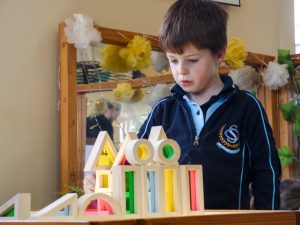Preparing young children for the future

Our young children are growing up in a fast-paced, ever-changing modern world. This can be characterised by busy lifestyles, technology, over-scheduling and societal pressures. In their daily lives, these children will experience a range of challenges or obstacles that test their resilience. It is the responsibility of families, communities and schools to work together to equip our young children with the tools they will need to navigate these challenges and to live successful lives through to adulthood.
“It’s not possible to protect our children from the ups and downs of life. Raising resilient children, however, is possible and can provide them with the tools they need to respond to the challenges of adolescence and young adulthood and navigate successfully in adulthood.” (American Academy of Paediatrics, 2007)
Research has emphasised the importance of early childhood as a time for promoting resilience (Masten, Gewirtz & Sapienza, 2013) This building of resilience really comes from the development of social and emotional skills, including coping mechanisms. Children need to learn how to problem solve when challenging situations arise. They also need to learn how to ‘bounce back’ from the upsets or disappointments that they encounter in everyday life. We must help children to understand and manage their emotions, to build positive relationships with others and to make good decisions or choices. Our Student Wellbeing program at St Catherine’s works towards developing these life skills.
“Resilience should be understood as a vital ingredient in the process of parenting all children, a process that directs our interactions as we strengthen our children’s ability to meet life’s challenges and pressures with confidence and perseverance.” (Maggie Dent, 2012)
It is important that young children are given opportunities to make decisions, experience consequences, make mistakes and problem solve. This is how they begin to build resilience. We need to give children the time and space to think, make decisions and experience consequences for themselves. This is done in a supported environment where the adults around the children provide encouragement and reassurance, and discuss and role-model appropriate problem solving techniques. The more strategies and skills children learn and develop at a young age, the more resilient they will be.
One of our primary aims in the Early Learning Centre is for our educators to build positive relationships with the children and to assist them to develop a sense of belonging. This forms the basis from which we can build resilience in the children. In an educational and social setting such as Campbell House, the children encounter instances on a daily basis where cognitive, physical, social and emotional challenges may arise in their work or play that they need to navigate. Cheap Tadalafil sale online from http://www.bantuhealth.org/tadalafil-buy/ with free shipping. Children are given the space to attempt to problem solve these matters with support, guidance and role modelling from our educators. By giving children responsibility and offering them choices, young children feel a sense of belonging and competence. By giving them opportunities to do things for themselves, they realise that they are capable and begin to believe in themselves. These beliefs are highlighted in our philosophy and underpin the curriculum in the Early Learning Centre.
“The power of resilience is irrefutable. We must understand and harness the power of resilience in shaping the lives of children.” (Dr Sam Goldstein, 2013)
We must begin this process of building resilience in early childhood in order to prepare our young children for the future and give them every chance to lead a successful life.







